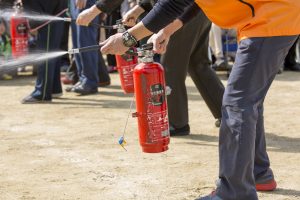Earthquakes Are Very Common in Japan
Everyone knows that Japan is an earthquake-prone country due to its location at the Pacific Ring of Fire, but the events of March 2011 made it much more real for many of us living in Japan as international students and foreign expatriates, or those who are considering a move to Japan. It is easy to think that since you cannot predict when or where an earthquake will occur, or what damage will result, you cannot do much to prepare for one. However, this is not the case.
We can learn how to be prepared by seeing how Japanese society prepares and educates their citizens to respond to earthquakes. Disaster risk management includes both planning for and responding to disasters. In Japan planning starts early — young children are educated about how important it is to stay safe. They learn to hide under a table or cover their heads when the shaking starts or when they hear an earthquake early warning alarm.
When you feel shaking, try to protect your head and stay calm. Once the shaking stops, you need to get accurate information and respond appropriately. The more you know about the information sources available to you and what information you need, the more likely you will be able to stay calm and make the best decisions about how to react.
Important Information and Communication Tools
There are plenty of ways to get the information mentioned above. However, there are two particular information and communication tools which I find highly useful and user-friendly. Firstly, it is “Yurekuru Call”. This is an app available for iPhone and Android that sends you a warning if an earthquake might occur in your registered location, which is part of the nationwide early warning system. Many Japanese telephones have this function already built into the phone, so it is worth asking your mobile company about this if you decide not to go for a smartphone.
The second one is the “Disaster Emergency Message Dial (171)”. This is a voice message board for communication when a disaster such as an earthquake or volcanic eruption occurs and telephone traffic to the disaster-stricken area increases making it difficult to transmit calls. By entering your landline phone number as a pin code, you can leave a message on the system where other family members who share the same landline number can listen to your message and record theirs as well.
See this link (https://www.ntt-east.co.jp/en/saigai/voice171s/hayawakari.html) for a helpful animation explaining how the system works. The system prompts are all in Japanese, but if you follow the steps you can still use this valuable tool even if you don’t understand Japanese. You can access the 171 system on the first and 15th of each month to practice. Set a date with your family and practice as soon as you can!
10 Steps to Reduce Risk of Injury in the Event of an Earthquake
- It is highly recommended to pick an apartment which is built after 1981 primarily due to stricter building codes which were established during that year. The more recent the apartment is built, the better.
- Find out where the nearest evacuation centre or earthquake shelter is located. This may be vital if your home becomes unsuitable to live in, or if there is a need for water and food supplies. To know these locations, you will have to visit your local ward office and ask for copies of evacuation maps and shelter locations. These maps are bilingual, so don’t worry.
- Choose a meeting place to reunite with your family and practice it by having home evacuation drills.
- Walk your local neighbourhood and locate public toilets and telephones.
- Register for information alerts from your ward office and your country’s embassy.
- If you have children attending school or child-care in Japan, know the school’s/care centre’s emergency plan and how to make contact with your child’s teacher or caregiver.
- Have multiple ways to contact your friends and family including home phone numbers (not just mobile numbers). Connect on Facebook, Twitter or other online networks. Practice using the 171 system (available on the 1st and 15th of every month).
- Stock up on supplies of essential food, medicine, drinking water and waste management tools. If water supply is affected then you might need to store lots of poop until services are re-established!
- Pack an evacuation bag including cash, passports, essential medication, food, water and spare clothes for each member of your family. Ensure that you regularly change the clothes for the changing seasons and as the children grow.
- Investigate ways to secure furniture in your apartment to prevent it from falling during an earthquake. It is commonly reported that there is always a significant number of casualties and injuries caused by falling objects or furniture. Therefore, at a minimum, you need to secure your refrigerator and any TVs or tall bookcases. Try to store heavy objects on lower shelves if possible. Do not place heavy paintings or mirrors above beds.











